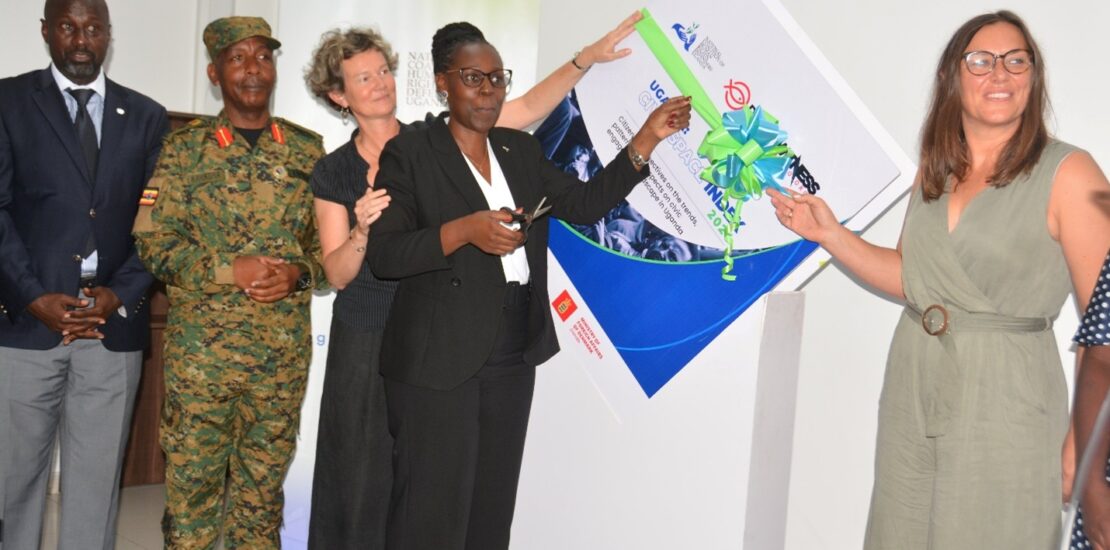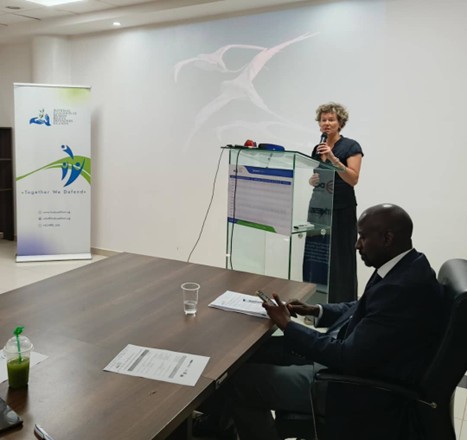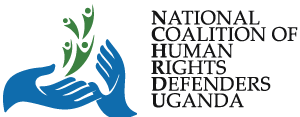- May 29, 2025
- Posted by: hrdcoalitionAdmin
- Category: News Updates

L-R; NCHRD-U Executive Director Robert Kirenga, UPDF’s Col. Deo Karikona, EU Delegate Laurianne Comard, and DCA representative Esther Nabwire officially launching the civic space index report
Yesterday, the National Coalition of Human Rights Defenders Uganda (NCHRD-U) launched the Civic Space Index Report 2024, titled “Citizenry Perspectives on Trends, Patterns and Prospects on the Civic Engagement Landscape in Uganda.”
The launch event, held in Kampala, brought together a diverse group of stakeholders including human rights defenders (HRDs), government representatives, civil society actors, private sector players, development partners, and members of the media. The report provides a comprehensive analysis of the current state of civic space in Uganda, with a special emphasis on citizen perspectives and experiences.
Speaking at the launch, the Executive Director of NCHRD-U Robert Kirenga emphasized that the report is more than just a document it is a reflection of the real challenges, aspirations, and resilience of Ugandan citizens who continue to advocate for a democratic and inclusive society amidst tightening restrictions.
“Civic space is not a privilege. It is a right. Where civic space is protected, development, accountability, and justice thrive. This report gives voice to citizens, civil society, and defenders who continue to shape Uganda’s democratic journey.”
He also noted that the report comes at a crucial time when the need for protecting and expanding civic space in Uganda has never been more urgent.”
“The Civic Space Index is a vital tool for policy makers, civil society organizations, development partners, and the public to better understand the realities on the ground, promote inclusive development and to shape strategies that safeguard the voices and freedoms of all Ugandans.”
The report evaluated civic space across key dimensions, including freedoms of expression, access to information, media rights, freedom of assembly and association, and human rights and rule of law. The findings indicate that Uganda’s civic environment has evolved over the past year, with citizens facing restrictions in exercising their constitutional freedoms.
Robert Kirenga further more noted that people are afraid to speak out due to fear of reprisal, and the space for civic engagement is limited. “It means that people are not effectively utilizing their right to participate in the governance affairs of this country because of so many restrictions in terms of freedom of expression,” he said.
“People are afraid to speak out what they think is not going right or is not going well simply because they feel there will be a reprisal and a reprisal may mean being arrested, may it be losing a job, may be uh also may be even detention” he added.
The European Union Delegation has supported the report, with Program Officer Laurianne Comard emphasized the importance of civic space for democratic governance and human rights. “Civic space is therefore crucial for the European Union as it measures the health of democracy and rule of law,” she said.
Comard added, “We are very pleased to have been able to support the 2024 Civic Space Index report for Uganda. That has been issued by the National Coalition of Human Rights Defenders in Uganda and that will be launched today.”
She emphasized the importance of partnership between the government and non-government organizations in building a society where democratic governance and human rights are protected and respected.
 Ms. Laurianne Comard – Program Officer- Democracy Governance & Social Inclusion, Delegation of the European Union in Uganda speaking during the launch of the report.
Ms. Laurianne Comard – Program Officer- Democracy Governance & Social Inclusion, Delegation of the European Union in Uganda speaking during the launch of the report.
Col. Deo Karikona the Director of Ideological Development at Uganda People’s Defense Forces highlighted that the country is safe regardless of some isolated incidences. It continues to grow from strength to strength. He also assured delegates that the country will have peaceful election in 2026 and the will of the people will be supreme.
Key Recommendations from the Report
The Civic Space Index Report 2024 calls for urgent and coordinated action from all stakeholders. Among the key recommendations include:
- Civil Society Organizations (CSOs):
- Strengthen Legal and Advocacy Capacities; CSOs are urged to invest in strategic litigation and legal expertise to challenge restrictive laws such as certain NGO Act amendments and other policies that undermine civic freedoms.
- Enhance Collaboration and Mutual Support
- Form cross-sector alliances involving media, youth, women’s groups, and marginalized communities.
- Establish mutual support systems like legal aid pools, safety monitoring networks, and rapid response mechanisms.
- Coordinate unified advocacy campaigns to promote collective resilience.
- Improve Digital Security and Remote Engagement; CSOs are encouraged to adopt secure digital tools and platforms, develop comprehensive digital security protocols, and explore alternative digital spaces to continue activism amid surveillance or internet shutdowns.
- Foster Regional and International Partnerships; Collaboration with regional and global networks is vital for resource sharing, solidarity, and applying international pressure for reforms.
- Promote Community-Based Civic Education; Grassroots civic education can empower citizens to participate meaningfully and safely in civic life, building a more informed and resilient civic movement.
- Government and Security Agencies:
- Adopt Transparent Protest Management Protocols
The Uganda Police Force (UPF) and Uganda People’s Defence Forces (UPDF) are urged to train personnel on human rights standards and implement non-violent crowd control measures. - Establish Independent Oversight Mechanisms
Government should create both internal and external accountability structures to investigate police and military misconduct, especially during civic engagements. - Demilitarize Civic Engagement
The role of the military in managing civic affairs should be clearly limited to prevent intimidation and preserve democratic space.
- Development Partners:
- Leverage Diplomacy and Conditionality; Use diplomatic influence and multilateral platforms to urge for policy reforms. Development assistance should be tied to Uganda’s adherence to international human rights obligations.
- NGO Bureau:
- Simplify and Clarify NGO Compliance Procedures; The Bureau is encouraged to reform its administrative systems to be more transparent, accessible, and non-restrictive—allowing NGOs to function freely and effectively.
As part of its ongoing commitment, NCHRD-U pledged to continue working with its partners to document threats to civic space, support at-risk HRDs, and advocate for legal and policy reforms that promote inclusive participation and respect for fundamental freedoms.
The full Civic Space Index Report 2024 is now available for download on the NCHRD-U website: www.hrdcoalitionug

